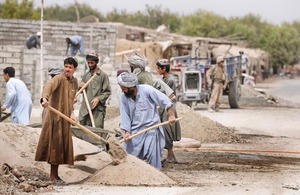Progress in Helmand a year after Op MOSHTARAK
The General in charge of ISAF forces in Helmand has spoken about the province's progression from a Taliban-controlled area to a civil, functioning society one year after Operation MOSHTARAK was launched.

Local Afghans construct new buildings to house shops which will effectively double the size of the bazaar in Helmand's Nawa district (stock image) [Picture: Senior Aircraftman Neil Chapman, Crown Copyright/MOD 2010]
Major General Richard Mills of the United States Marine Corps is in charge of ISAF’s Regional Command (South West) which, based in Helmand, oversees coalition activity in Helmand and Nimruz provinces.
Operation MOSHTARAK, the Afghan-led initiative to assert government authority in the centre of Helmand province, was launched in February 2010 with the backing of troops from the UK, the US and other nations in the ISAF coalition.
The operation was broadly intended to expand security and Afghan Government influence to the areas of Chah-e Anjir, western Babaji, Trikh Nawar, and Marjah.
It was launched by a combined force of 15,000 troops, with the British and their Afghan partners focusing on the areas around Nad ‘Ali, and the Americans and their Afghan partners focusing on the Marjah region.
Following the successful ‘clearing’ phase of Operation MOSHTARAK, stabilisation has been taking place which has involved the Afghan Government and international partners establishing civil authority and setting up projects to provide amenities such as hospitals and schools to improve conditions for the local population.
It was believed that with the permanent security provided in these areas by Afghan and ISAF forces, along with the improvement of infrastructure, the Taliban would not be able to re-establish themselves.
See Related News to read more about the operation.
Speaking on the anniversary of the operation, Major General Mills said:
A year ago [Marjah] was the Taliban capital of Helmand province, a completely controlled Taliban area. That has changed 180 degrees in the past year, and it’s now a small farm town that is vibrant, with five bazaars with a great number of customers and business on every day of the week.
It’s a great success story by the Government of Afghanistan and what they have done to stand up a secure environment.
Schools have reopened in Marjah, with several hundred children attending classes.
Garmsir district in central Helmand province has also made progress and last week a girls’ school was opened.
The school house was a former women’s centre before the Taliban closed the facility to prevent women from gathering in public.
Lieutenant Colonel Matthew Reid, Commander, 2nd Battalion, 1st Marine Regiment, United States Marine Corps, said:
In a district where we literally just cleared the Taliban from walking the streets, you’ve got a community that’s willing to step forward and open a girls’ school.
The citizens of Helmand are also helping Afghan and coalition forces to end drug trafficking in the province by providing tips on Taliban movements and poppy cultivation.
General Josef Blotz from the German Army said:
Poppy cultivation has been cut to minimal levels in central Marjah, and the drug bazaar has been shut down. Governor Mangal is leading the way to decrease narcotics trafficking throughout Helmand, where more than two-thirds of all cultivation in Afghanistan in 2008 occurred.
Major General Mills highlighted the importance of Marjah, explaining how, during the past year, coalition and Afghan forces have routed the Taliban from the town, allowing numerous changes to take place.
On recent visits with tribal elders, especially in the traditionally conservative Sangin district, the General said the elders are asking for schools to be built and want their women to attend:
This is a rural area, an area in which the Taliban wouldn’t allow [women] to go to school, and now we’re seeing a growth in the female population, which is very heartening. We estimate over 20,000 young girls are going to school this year within the province,” he said.
He also said that if you look back a year to when the surge began, there was a very robust insurgency network in place that controlled the province. Since then, the Taliban have suffered defeats by Afghan and coalition forces. The population has turned on the Taliban and now many areas of Helmand are secure and government agencies beginning to flourish.
Due to increased security in the province, future forces may be allocated to different locations based on where territory will need to be secured, according to the General:
If we continue on the path that General Petraeus has laid down, we continue to use that glide slope as we raise the calibre of the Afghan Army, as we raise the calibre of the Afghan security police forces, and as we raise the calibre of the Afghan local governments to take over, I think that there is a time in the [foreseeable future] where we can begin to move our forces away,” said Major General Mills.